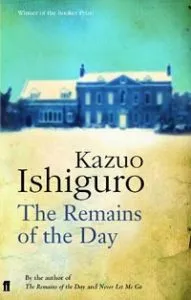
The Father-Son Relationship in The Remains of The Day
This content contains affiliate links. When you buy through these links, we may earn an affiliate commission.
Let’s talk about the father-son relationship in the 1989 Booker Award-winning The Remains of The Day by Nobel laureate Kazuo Ishiguro. Let’s not talk about why it took me so long to get around to reading this wonderful book that Maxine Hong Kingston called, “wonderful in every sense–story, language, and understanding.”
Okay, fine, let’s do talk about it.
I had heard that the book was…cold. And that the movie was better, okay? But don’t you make the same mistake. To start, here’s an Ishiguro reading pathway.
 Of impressive repression of emotion there is MUCH. MUCHLY. Perhaps because I am a parent what gutted me beyond The Remains of the Day‘s stunning, larger WWII historical themes and the non-starter relationship with Miss Kenton (played in the movie by Emma Thompson), was the exceedingly tiny lost sequin parlor drama of the relationship between the father and the son, Mr. Stevens, the exemplary butler father and Mr. Stevens, an equally exemplary butler son. Between them the emotion is tamped down so far that this is a typical exchange:
“My father had opened the curtains and was sitting, shaved, and in full uniform, on the edge of the bed where evidently he had been watching the sky turn to dawn…The oil lamp beside his bed had been extinguished, and when I saw my father glance disapprovingly at the lamp I had brought to guide me up the rickety staircase, I quickly lowered the wick.”
Or:
“I have come here to relate something to you, Father.”
“Then relate it briefly and concisely. I haven’t all morning to listen to you chatter.”
“In that case, Father. I will come straight to the point.”
“Come to the point then and be done with it. Some of us have work to be getting on with.”
Of impressive repression of emotion there is MUCH. MUCHLY. Perhaps because I am a parent what gutted me beyond The Remains of the Day‘s stunning, larger WWII historical themes and the non-starter relationship with Miss Kenton (played in the movie by Emma Thompson), was the exceedingly tiny lost sequin parlor drama of the relationship between the father and the son, Mr. Stevens, the exemplary butler father and Mr. Stevens, an equally exemplary butler son. Between them the emotion is tamped down so far that this is a typical exchange:
“My father had opened the curtains and was sitting, shaved, and in full uniform, on the edge of the bed where evidently he had been watching the sky turn to dawn…The oil lamp beside his bed had been extinguished, and when I saw my father glance disapprovingly at the lamp I had brought to guide me up the rickety staircase, I quickly lowered the wick.”
Or:
“I have come here to relate something to you, Father.”
“Then relate it briefly and concisely. I haven’t all morning to listen to you chatter.”
“In that case, Father. I will come straight to the point.”
“Come to the point then and be done with it. Some of us have work to be getting on with.”
The Remains of The Day Repression
 Of impressive repression of emotion there is MUCH. MUCHLY. Perhaps because I am a parent what gutted me beyond The Remains of the Day‘s stunning, larger WWII historical themes and the non-starter relationship with Miss Kenton (played in the movie by Emma Thompson), was the exceedingly tiny lost sequin parlor drama of the relationship between the father and the son, Mr. Stevens, the exemplary butler father and Mr. Stevens, an equally exemplary butler son. Between them the emotion is tamped down so far that this is a typical exchange:
“My father had opened the curtains and was sitting, shaved, and in full uniform, on the edge of the bed where evidently he had been watching the sky turn to dawn…The oil lamp beside his bed had been extinguished, and when I saw my father glance disapprovingly at the lamp I had brought to guide me up the rickety staircase, I quickly lowered the wick.”
Or:
“I have come here to relate something to you, Father.”
“Then relate it briefly and concisely. I haven’t all morning to listen to you chatter.”
“In that case, Father. I will come straight to the point.”
“Come to the point then and be done with it. Some of us have work to be getting on with.”
Of impressive repression of emotion there is MUCH. MUCHLY. Perhaps because I am a parent what gutted me beyond The Remains of the Day‘s stunning, larger WWII historical themes and the non-starter relationship with Miss Kenton (played in the movie by Emma Thompson), was the exceedingly tiny lost sequin parlor drama of the relationship between the father and the son, Mr. Stevens, the exemplary butler father and Mr. Stevens, an equally exemplary butler son. Between them the emotion is tamped down so far that this is a typical exchange:
“My father had opened the curtains and was sitting, shaved, and in full uniform, on the edge of the bed where evidently he had been watching the sky turn to dawn…The oil lamp beside his bed had been extinguished, and when I saw my father glance disapprovingly at the lamp I had brought to guide me up the rickety staircase, I quickly lowered the wick.”
Or:
“I have come here to relate something to you, Father.”
“Then relate it briefly and concisely. I haven’t all morning to listen to you chatter.”
“In that case, Father. I will come straight to the point.”
“Come to the point then and be done with it. Some of us have work to be getting on with.”



